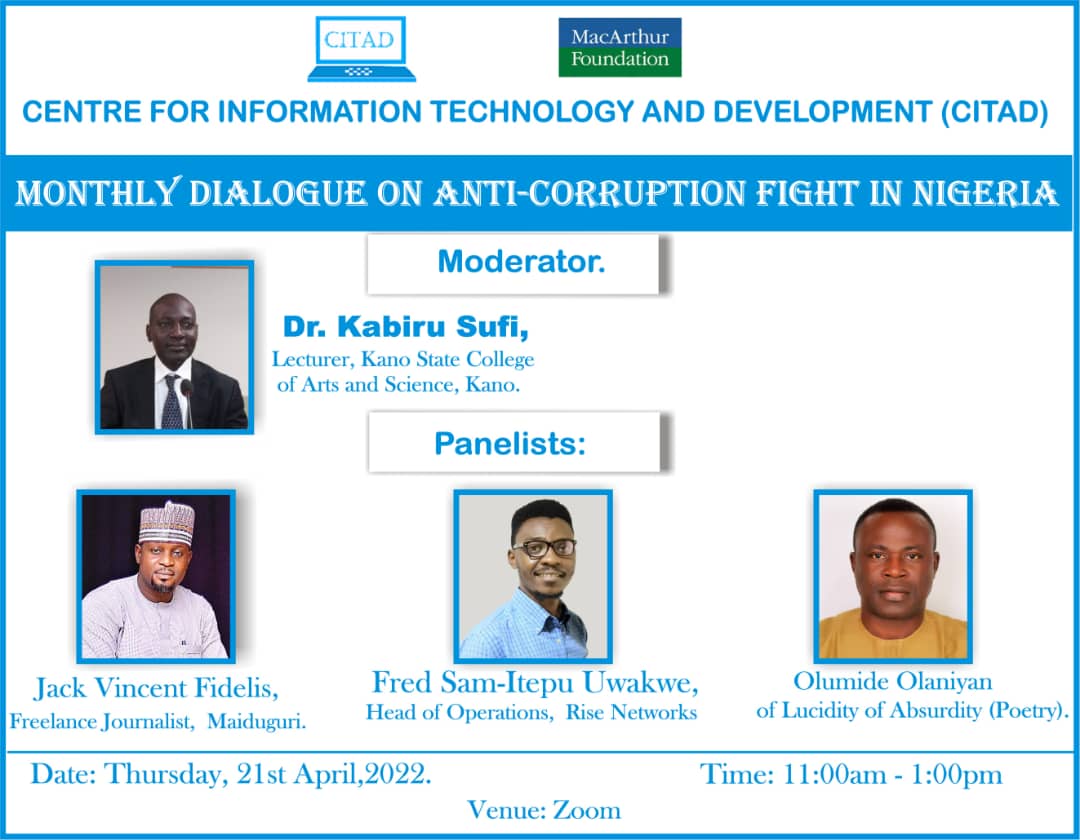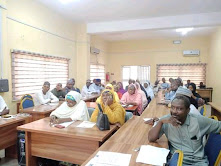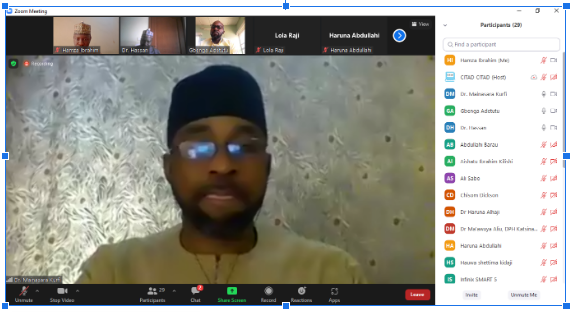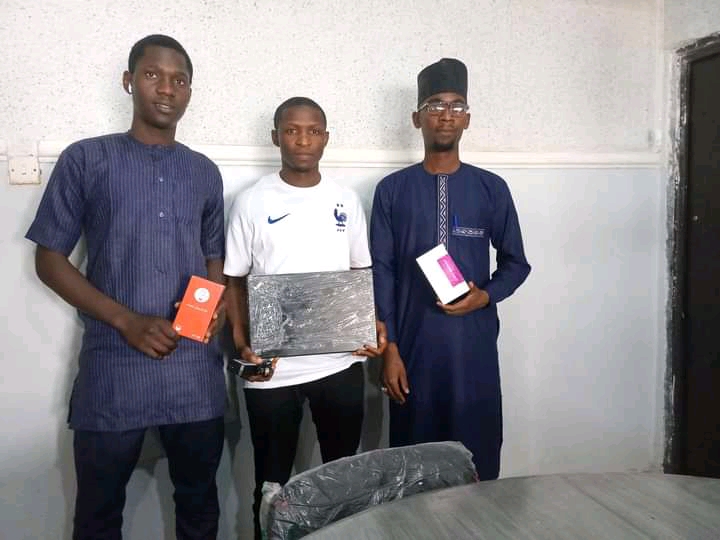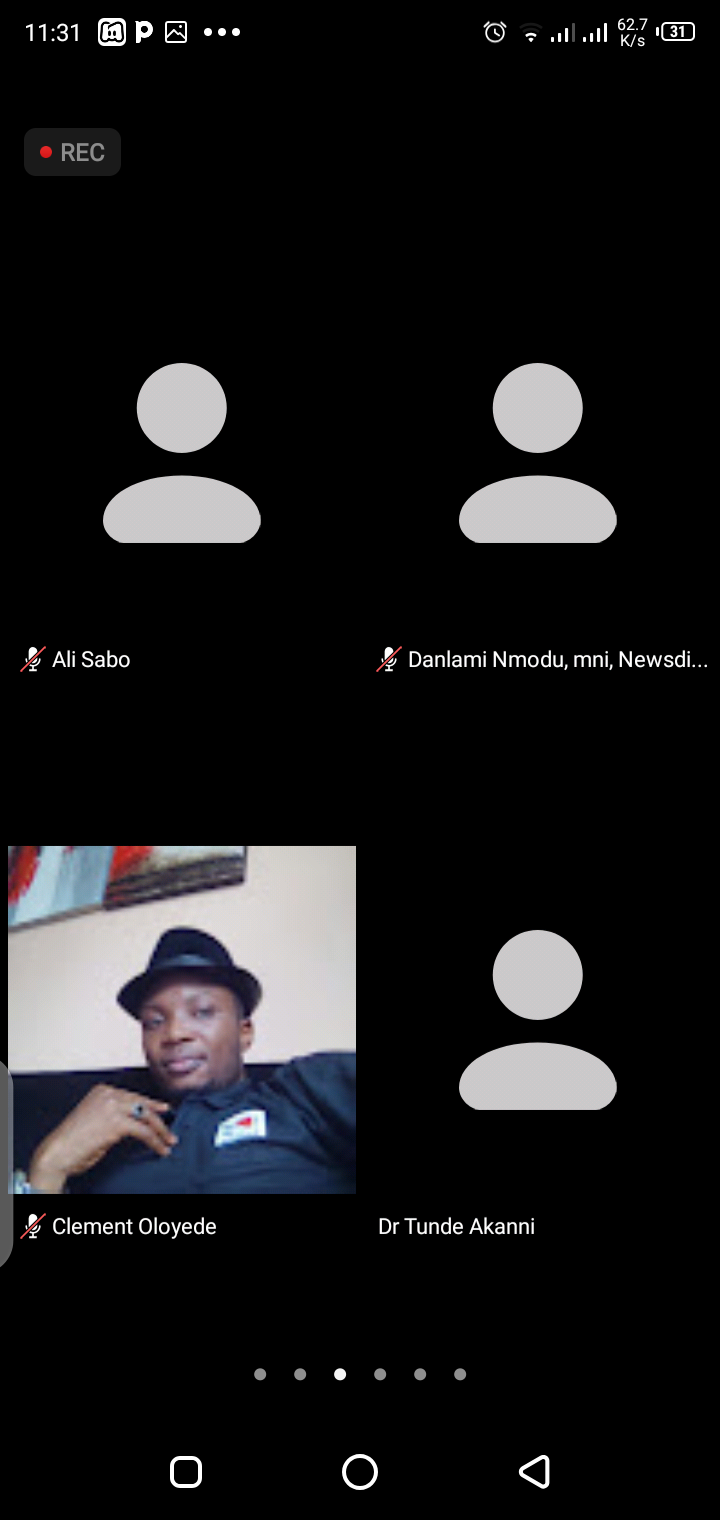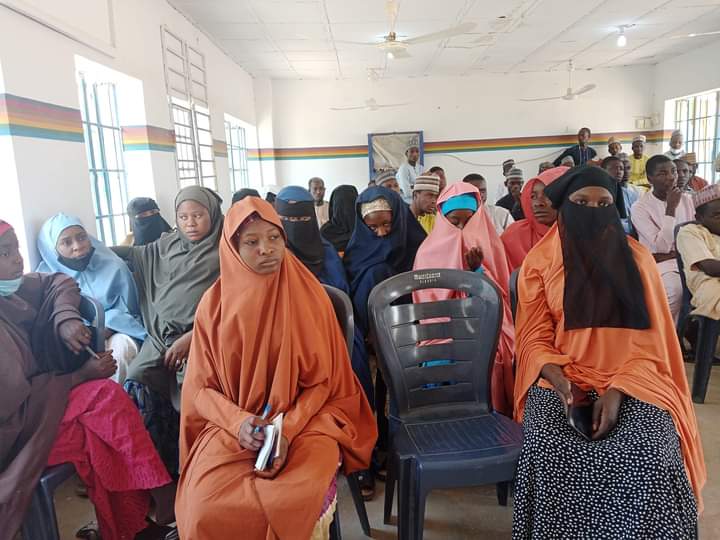ADVERT FOR STAFF VACANCIES
Centre for Information Technology and Development (CITAD) here by advertises for the following vacancies in its various offices as indicated by the positions and therefore invites application from interested qualified individuals.
SENIOR PROGRAMMES OFFICER (KANO)- External
This person will lead programmes and will have the following responsibilities:
- Support the Programmes Coordinator in liaising with development partners and others with a view to leveraging opportunities for the organization;
- Coordinate some Programmes and activities including in designing programmes and activities in the projects she/he is coordinating;
- Generate ideas for the development of new projects, proposals, programmes or activities;
- Support the development of new proposals
- Mentor other staff in proposal development and writing;
- Participating in regular intake and case review meetings, in partnership with community organizations, to assess community needs;
- Working with community groups and attending meetings around human rights and social justice efforts;
- Any other responsibility that may from time to time be assigned to him/her in consistent with the goals of the organization
Essential Skills
- Versed in IT for development literature
- Excellent communication and documentation skills
- Proposal writing skills
- Team work
- Ability to work under little supervision
- Critical thinking and innovative skills
- Excellent administrative and organizational skills, including office software
Qualifications
- Ph.D or M.Sc. in any social sciences or humanities; Minimum of one year (for Ph.D holder) and two years (for M.Sc) relevant experience, working with civil society organizations. Those with First degree must have four years of cognate experience
Requirements
- Must have written at least three successful project proposals in the past
- Evidence of at least two publication reports or journal articles (not newspaper article)
- The ideal candidate for should be less than 40 years old
- Must be IT literate, versatile in the use of office productivity tools
- Ability to travel frequently and at short notice is desirable
PROGRAMMES OFFICER (Training Officer, KANO), position available only for female candidates
Responsibilities of the Position
- Coordinate Gender Digital Inclusion works
- Support works around gender violence against women
- Tracking data on projects/programmes implementation
- Leading on gender digital entrepreneurship programmes
- Documenting programmes/projects you are working on
- Developing proposals and project initiatives
- Tracking and documenting impact on lives of past programmes beneficiaries
- Taking part in other programmes of the organization and generating reports from such activities where required
Essential Skills
- Website design skills (Content Management System and PHP)
- App development skills
- Coding
- Gender analysis
- Feminist internet Principles
Qualifications
The right candidate must have a good degree in Social sciences or Technology related subject. A post graduate diploma or degree in the relevant field is an advantage with at least four years of working in the development sector. Familiarity with technology and gender issues is essential
Requirements
- Evidence of at least two-year’s experience in the civil society sector
- Evidence of one successful proposal written
- Ability to teach ICT courses
- Training/ Facilitation skills
- Understand the operations of tech start ups
- A minimum of two examples of report written either published or authenticated by former employers
- The ideal candidate for should be less than 35-year-old
- Ability to travel frequently and at short notice is desirable
PROGRAMMES COORDINATOR (KANO)- External
This person will head the Programmes Department and will have the following responsibilities:
- Continuously keep an opened eye for new areas of engagement;
- Liaising with development partners and others with a view to leveraging opportunities for the organization;
- Ensure that all activities reports are properly documented and archived;
- Generate ideas for the development of new projects, proposals, programmes or activities;
- Lead in the development of new proposals
- Support Project managers in designing programmes and activities in the project they are coordinating;
- Establish and maintain a knowledge resource for the organization;
- Mentor other staff in proposal development and writing;
- Help to distill issues of interest that may require follow up, new activities/programmes or new proposals;
- Participating in regular intake and case review meetings, in partnership with community organizations, to assess community needs;
- Working with community groups and attending meetings around human rights and social justice efforts;
- Understanding the services offered by other non-profits and government agencies and drawing upon these resources to most effectively serve.
- Any other responsibility that may from time to time be assigned to him/her in consistent with the goals of the organization
Essential Skills
- Versed in IT for development literature
- Excellent communication and documentation skills
- Proposal writing skills
- Team work
- Ability to work under little supervision
- Critical thinking and innovative skills
- Excellent administrative and organizational skills, including office software
Qualifications
- Ph.D or M.Sc. in any social sciences or humanities; Minimum of two years (for Ph.D holder) and four years (for M.Sc) relevant experience, working with civil society organizations. Those with First degree must have six years of cognate experience
Requirements
- Must have written at least three successful project proposals in the past
- Experience or knowledge of innovation system, incubator programmes and startups management
- Evidence of at least two publication reports or journal articles (not newspaper article)
- The ideal candidate for should be less than 45-year-old
- Ability to travel frequently and at short notice is desirable
Technology Innovation Officer (TIO), position available in Gombe
Responsibilities
- Be the coordinator of the technology hub of the organization
- Coordinate the start-ups programmes of the organizations
- Lead in the apps development programmes of the organization
- Develop and deliver appropriate training programmes for technology developers
- Be part of the general training programmes of the organization
- Any other relevant assignments that may from time to time be assigned to the staff
Essential Skills
- Website design skills (Content Management System and PHP)
- App development skills
- Coding
- Training/ Facilitation skills
- Experience in running an incubator space
- Experience in raising a start up
Qualifications
The right candidate should have an IT related degree or professional certification. Registration with CPN is an advantage. Two years of cognate experience in an incubator space or similar setting is required.
Requirements
Candidate will provide evidence of websites sh/he designed and maintained, examples of app he/she has developed and any other innovative deployment of technology he or she has been involved in
Age Range: 25-40
CONDITIONS OF SERVICE
Salary and other conditions of service are commensurate with skills, experience and innovative initiatives
ACCOUNTS OFFICER. POSITION available in Abuja
Requirements
Qualification: a minimum of HND in Accounting or related field. Possession of a professional certification will be an added advantage. Understanding of non-profit sector operation is required.
Cognate experience: must have at least two years of post-graduation experience in an NGO setting.
Others: candidates from FCT, Kogi or Niger States are strongly recommended to apply.
Responsibilities
- Prepare monthly financial reports.
- Prepare and maintain all financial documents.
- Responsible for financial management.
- Disbursement and accounting for funds during activities.
- Prepare annual financial budget and reports.
- Handle all payments for statutory deductions to relevant agencies.
- Be part of the Procurement Committee of the Office.
- Support the Project teams in the implementation of various project activities in Abuja Area office.
- Reconciliation of Bank Statement and Cash book
- Any other tasks that may be assigned to him/her consistent with the his or her skills and training as may be decided from time to time by the Management of the organization.
Skills
In addition to bookkeeping and other accounting skills, the desired candidate must be computer literate and know how to use Excel as well as any other accounting software.
Reporting line: the person will report to and work with the head Office, under the supervision of the organization’s Human Resource Manager.
HUMAN RESOURCE OFFICER (KANO)- EXTERNAL
The person will head the Personnel Department of the organization and will have the following responsibilities:
- Keep up to data employees’ records
- Be custodian of staff reporting on duty register
- Keep records for all staff leave, including sick leave
- Receive and process leave request by staff
- Serve as Secretary to any staff recruitment interview
- Provide relevant documents for staff appraisal process
- Process tax certificates for staff members
- Ensure that the organization is at all-time compliant of all relevant labour laws
- Responsible for drafting reference letters for current and former staff of the organization
- Any other assignments that may from time to time be assigned to the office by either the management and or the Board members.
Essential Skills
- Have clear understanding of what Human Resource Management entails
- Good ICT skills
- Good communication skills
- Ability to use online tools for tracking staff performance
Qualifications
The right candidate must have a Degree in Administration Science or any social science. A Master degree will be an advantage. Two years’ experience in similar position.
Requirements
At least two years of relevant experience
One-year experience of working in the civil society or development sector
Business Development and Marketing Officer (BDMO), Kano or Gombe
- Lead in the marketing of the programmes, produces and services of the organization
- Promote apps and solutions developed in the organization
- Harvest and promote start-ups out of the organization
- Develop and concretize business ideas for the organization
- Coordinate the social entrepreneurship programmes of the organization
- Any other relevant assignments that may from time to time be assigned to the staff
Essential Skills
- Business development skills
- Marketing skills
- Digital marketing knowledge
- Partnership building skills
- Proposal development
Qualifications
The right candidate should have a degree in Marketing or Business Administration or any related field. MBA is an advantage. Two years of cognate experience in a Marketing position is needed.
METHOD OF APPLICATION
Interested qualified person should apply providing the following:
- Cover letter should capture why the applicant thinks he/she is suitable for the job
- Current CV
- Names and full contacts of three referees, one of who must be previous employer (if she or he has worked)
- Scanned photocopies of credentials
- Details of publications or scanned copies (as relevant to the position you are applying)
- Copies of previous reports or proposal written (as relevant to the position)
DATELINE:
Interested persons should submit their application with all relevant attachments to info@citad.org, not later than May 31, 2022.



